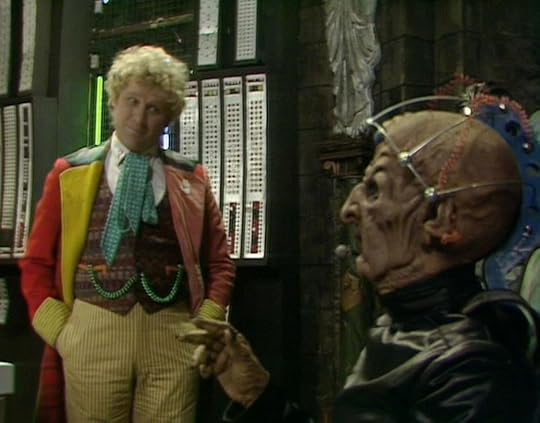Buying In and Selling Out: Has Marketing Muzzled Our Hero?
Bar Nash-Williams is a writer at Kasterborous Doctor Who News and Reviews - All the latest Doctor Who news and reviews with our weekly podKast, features and interviews, and a long-running forum.
Doctor Who belongs to us, all of us. Peter Capaldi says so.
In the world tour event in Rio he said the show belongs to us, the fans, and I am more than happy to belong to the show, as a supporter and advocate. But I’d hate to be described as a stakeholder in the Who Franchise. Yes, I own most of the DVDs, classic and 2005 onwards, and hope to get the rest in time. Yes, I own dozens of BF audios and would love hundreds more (when I’ve saved up!). Yes, I’m accumulating reference books about the show. But I can’t claim to be a real ‘Collector’ – My house isn’t crammed with merchandise and memorabilia; I’ve never owned an action figure, comic, or target novelisation. But I appreciate those who do ‘buy into’ Who in that way. Can you remember saving up pocket money to buy your next ‘fix?’ I trust you Kasterborite collectors to compensate for my inadequacies on this in the comments below!
The belief that a shop in a hospital would make people feel happy and comfortable rang danger bells. Am I missing some subtle subtext?
The endless, inventive creativity of Who fans is another way of ‘buying in’ for free, as it were. I can’t hope to produce the sort of mini-films that grace YouTube and occasionally get their creators invited to work with the current Who team, but have been known to knit the odd TARDIS or build a snow dalek, and I’m working on a TARDIS to store the aforementioned DVDs etc.
Though far too shy for cosplay I am thrilled at the lengths people go to honour their favourites by making a not-fashion statement. I have been encouraged by Peter Capaldi’s emphasis on making Who accessible to all, regardless of spending power. He chose his costume to be copyable in the playground without financial outlay: take your school tie off, shove your jacket back and stick your hands in your pockets. And carry a spoon. He resisted the offer of his own model sonic. I quote the Metro: “Commenting on the lack of new sonic screwdriver for Capaldi’s Doctor’, writer Gatiss quipped, ‘I amazed they’ve missed the marketing opportunity!’ To which Peter disagreed, ‘Well I think we should side step the marketing opportunities. I don’t think we should be too focused in that direction’.”
Selling Out
But is Who swept up in the trend to commercialise and commodify everything, whether we like it or not? Or worse still, has its relationship with the hugely successful marketing wing of the Sirius Cybernetics Corpo – sorry, BBC Worldwide – blunted its cutting edge?
Though New Earth is never going to be one of my favourites, it does at least criticise the lengths to which we will go to be not only healthy, but young, beautiful and ‘pure.’

Don’t ask about our R&D dept.
But I remember feeling uneasy when the Tenth Doctor complained that the hospital didn’t have a shop (the start of a running gag in NuWho).
Doctor: Nice place. But no shop downstairs. I’d have a shop. Not a big one, just a shop so people can shop.
Sister: This hospital is a place of healing.
Doctor: Well, a shop does some people a world of good. Not me, but other people.
I would have wanted a café where I could enjoy hospitality, have a cuppa and chat with folk. But the belief that a shop would make people feel happy and comfortable rang danger bells for me. Am I missing some subtle subtext here that providing a shop so that people can be consumers goes well with consuming people so richer people can be healthy?
Okay, perhaps I’m in an ever-shrinking minority, but I was influenced by Who in the 70s and 80s, when inhuman corporate power and body-horror commodification were all the rage. When thinking of people as ‘consumers’ let alone commodities to be consumed would have been anathema. Any government, corporation or political leader (human or alien) who treated people (human or alien) as means not ends engendered the Doctor’s wrath. The Savages:
‘They have discovered a way of extracting life’s force,’ explains the Doctor, ‘and absorbing it into themselves.’
‘Why the concern?’ Edal sneers. ‘They’re only savages.’
The Doctor is furious. ‘They’re men,’ he replies. ‘Human beings – like you and me.’
Their great progress has come at too high a price: “the sacrifice of even one soul is too great.”
Sometimes it’s a more visceral use of bodies, e.g. Revelation of the Daleks (the one that really blurs the lines between them and Cybermen) A rather different take on Spare Parts.
The Doctor: But did you bother to tell anyone they might be eating their own relatives?
Davros: Certainly not! That would have created what I believe is termed “consumer resistance.”
A Grotesque Abuse: Overlooked
Sadly, when they used the same idea in Death in Heaven there was so much emphasis on the relationship between Danny and Clara, and between Missy and the Doctor that there was no time to comment on the grotesque abuse of the dead. In Dark Water the Doctor dismissed it as a con trick, but not a moral outrage, or an unforgivable use of people as a means to an end. Maybe we’re meant to infer it, but I’d like to see the Doctor angry sometimes. Capaldi’s capacity for passionate, even dangerous emotion was shown in the console room when he discovered Missy’s lie, and felt his own loss. Why not direct some of that at the attitudes, systems and PTB that cause others such pain?
Matt Smith’s wonderful little speech in A Good Man Goes to War shows he can get angry, but only because they used his friends. Let’s see the Doctor get this animated on behalf of people he doesn’t even know.
NuWho‘s trope that everyone is important (A Christmas Carol) and that ‘ordinary’ people matter (Father’s Day) is all very nice, but where does it criticise the systems that treat people as labrats, surety, or dirt?
Regular Kasterborous commenter TheLazyWomble pointed out that Flatline showed a little social comment in the set-in-stone attitude of the supervisor to Rigsy and his peers. Even a trip in the TARDIS didn’t change him. The Doctor encouraged Rigsy in his artistic talent, but said nothing about his situation. Was the story’s critique of the system that creates an underclass, writes off the young unemployed, and is slow to investigate when their loved ones go missing overt enough for many to notice? I’m not advocating for the unsubtlety of The Creature from the Pit, but where’s the moral outrage, the stirring up of the oppressed to take a stance? At least in The Savages it is made clear that the underclass was created by the system, and is not their own fault.
‘You know, my dear, there’s something very satisfying in destroying something that’s evil, don’t you think?’
(The Savages)
Now I’ll admit that the general tenor of 70’s and 80’s Who was anti-establishment, anti-corporate power, and occasionally made Arthur Scargill look right-wing. Its unsophisticated forays into the mining dispute (Monster of Peladon), tax and debt (The Sunmakers) and the Thatcher government (The Happiness Patrol) are well-known. But to me, the particular political flavour is not important; it’s the freedom of the show to critique ANY social, political or cultural status quo that I fear is softened these days.
Perhaps how we feel about this depends on what we see as the threat in the status quo. I suggest that Who shows a clear progression on the commodification threat.
The Horror of Industrial Automation
In Spearhead from Space the threat they criticised was automation, mass-production, and the products turning on us – perfectly captured by this shot of the gun-toting Autons with price-labels still attached, huge adverts on the wall, and a typical shopping street behind them.

An extra models the Pertwee death pose! So that’s where he got the idea.
By Terror of the Autons one season later the threat was not so much the product as the undiscerning consumer who preferred plastic flowers to real ones, uncomfortable blow-up chairs, and troll-dolls that took ugly to new depths.
What are these going for on eBay?
But is NuWho leading any resistance to the threat of us becoming the product? Kasterborous’ recent discussion on Christopher Eccleston highlighted this issue for me: Alongside K’s usually temperate comments were opinions that people only become actors in order to be rich and famous, celebrities ‘owing’ us (!) and even in one comment, us ‘owning’ them! The replies championing CE’s freedom as an actor and human being were a relief, but the fact that a sector of Who fandom sees the world in terms of consumerism, commodification, and ownership of persons is worrying. Consider the Spoonheads: “walking wifi base station hoovering up data, or people.”
As though they’re the same thing.
The Doctor: Imagine that. Human souls trapped like flies in the World Wide Web, stuck for ever, crying out for help.
Clara: Isn’t that basically Twitter?
Does The Bells of St John do it for you, or was it too wrapped up in the humour, tech and CGI to pack any punch? Early Who might have been ham-fisted in its moral outrage and the clarion call to take a stand, but does new, glitzy, world-touring Who just expect us to laugh?
So, come back at me people; has Who sold out to consumer culture, or are there stories in modern who that remind us that a person’s value in society is more than just their power to buy, and what we need to make us happy is not just ‘a little shop’?
The post Buying In and Selling Out: Has Marketing Muzzled Our Hero? appeared first on Kasterborous Doctor Who News and Reviews.
Christian Cawley's Blog
- Christian Cawley's profile
- 4 followers







